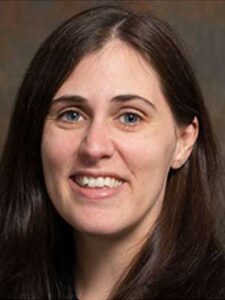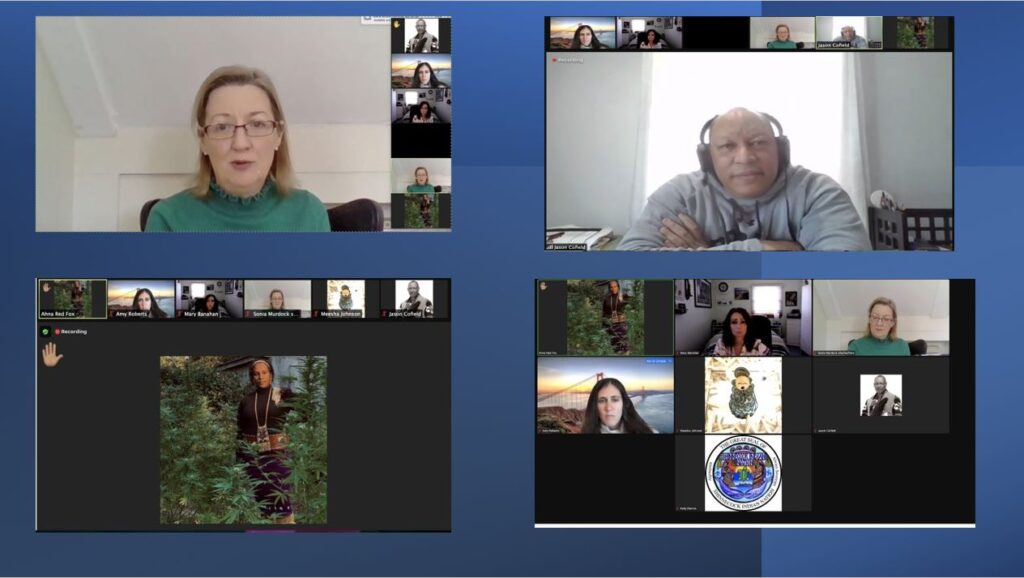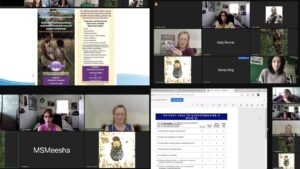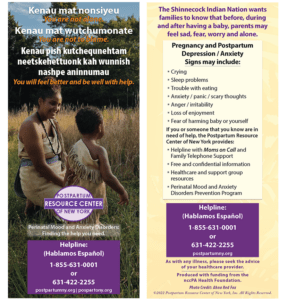Meet Two PAs Working to Improve Access to Maternal Mental Health Care
Inspired by Personal Experience, Mary Banahan and Amy Roberts Worked to Expand Access to Care for Indigenous Women
October 12, 2022
By Sarah Blugis

When Mary Banahan MS, PA-C and Amy Roberts, PhD, PA-C, met as educators the Hofstra Northwell School of Graduate Nursing and Physician Assistant Studies, they were fast friends. “We kind of call ourselves kindred spirits because personality-wise, we’re very similar,” says Banahan. “Amy and I share the same views on the students, our views on PA education and how students should be treated. We definitely have a special bond.”
Roberts is a clinical educator and academic coordinator at Hofstra, working closely with didactic students, and practices family medicine part-time. Banahan is full-time faculty and is also the PA program’s dual-degree coordinator, advising undergraduate students enrolled in Hofstra’s pre-PA program who begin the PA program in their senior year.
Drawn to the PA profession because she always knew she wanted a career in medicine, Banahan has never looked back. “It was one of the best things I ever did, for sure,” she says. After graduating, she jumped into education, teaching at the same PA program from which she graduated. Then, after practicing for over ten years, Banahan took a position as a clinical coordinator and has held various academic positions ever since.
Roberts, too, was drawn to PA education shortly after graduating, and began adjunct work at Hofstra – her alma matter. “Right away, I knew I wanted to do this full time. I love working with the students, especially so early on in my career, because I could really emphasize with what they were going through,” Roberts says.
As it turned out, Banahan and Roberts learned they had more in common than just their commitment to PA education: Both women have personal experiences with mental health issues, and are passionate about raising awareness around maternal mental health.

Struggles with Postpartum Depression
When Banahan had her first son, she says, she experienced a short period of postpartum depression, though she didn’t recognize what it was she was going through. “I didn’t learn about postpartum depression in PA school,” Banahan says. But when she had her second son, her postpartum depression was significantly worse.
“I started to really get depressed, and I had postpartum OCD,” she says, explaining that she was hyper-focused on her newborn son because he had several medical issues. “I wasn’t really sleeping because I was so focused on making sure he got up to eat. And I would wake up in the morning and think, how am I going to get through another day doing this? I really had a very hopeless feeling.”
Though Banahan wasn’t experiencing suicidal thoughts, she says she struggled to see the light at the end of the tunnel. So, she reached out to her sisters, who helped her find the Postpartum Resource Center of New York. There, Banahan attended a support group – and initially, she resisted pharmacological treatment.
“Being a PA is sometimes a double-edged sword. We can be the worst patients. I thought to myself, these are things I prescribe. I don’t take these things, myself,” Banahan says. But after encouragement from friends, she returned to her obstetrician and got a prescription for a selective serotonin reuptake inhibitor (SSRI). “It still took me a couple of weeks to take it but once I did, I started to feel better.”
After a few months, and after working with the support group, Banahan’s mental health improved significantly. Right away, she started volunteering for the Postpartum Resource Center of New York and has done so ever since, now for more than 20 years. She has volunteered her time in nearly every capacity – from facilitating a survivors group, to working as an advocacy team leader advocating for legislation, to fundraising.
Because she had never learned about postpartum depression in PA school, Banahan decided to create a lecture for her students focused on perinatal mood and anxiety disorders. “I tell them my story and I’m hysterical through the whole thing, crying but sharing, and very open to questions,” she says. “And I think it does make a good impact on the students.”
Infertility and Mental Health
Banahan’s lecture inspired Roberts to share her own story about her experience with infertility, and the mental health issues that often surround it. She struggled for over two years to have her child, who is now six. One of the most difficult parts, she says, was that she received “the horrible diagnosis of ‘unexplained.’”

Roberts did seven treatments, all of which failed, and was given an eight percent chance of getting pregnant. After seeing a fertility specialist, she began working with a new physician. He recommended that she take a break for a month before beginning treatments again. Then, Roberts got pregnant on her own.
She knew she wanted two children, so Roberts began trying again as soon as she was cleared after having her son. She got pregnant again when her son was ten months old, but two days before his first birthday, she had a missed miscarriage. Roberts had a dilation and curettage (D&C) and unfortunately, was never able to get pregnant again. Through the entire experience, she struggled with depression and anxiety.
Going through fertility treatments, Roberts says, is like a full-time job. She felt she couldn’t take a vacation because of the demands of treatment and tracking ovulation, and often went to early-morning appointments.
“Then I’d have to go to work on my clinical job and tell patients they were pregnant, and it was devastating,” she says. “It was even harder when there are patients who are unhappy about being pregnant, while you’re going through this very personal thing. It’s a lot to deal with.”
Though she never sought treatment for her depression and anxiety, Roberts noticed that her mental health improved when she accepted that she was not going to have another child.
“The hard thing about this whole experience was that all these practitioners knew I was going through fertility treatment, and not one person asked about my mental health,” Roberts says. “Now I’m so hyper-aware of it when I have patients come in and they tell me they’re doing IVF or going through treatments.”
In her own day-to-day practice, Roberts makes sure to ask her patients who are struggling with infertility if they’re seeking mental health treatment. Like Banahan, she has also developed a lecture for her students focused on how to help patients (and the partners of patients) dealing with infertility.
Confronting Racial Inequalities in Maternal Mental Health in Indigenous Women
Earlier this year, Banahan was taking part in a webinar about maternal suicide, sponsored partially by the Postpartum Resource Center of New York. One of the webinar slides included statistics on suicide among postpartum women – and one figure, in particular, stood out to her.
According to one study, occurrences of pregnancy-associated suicide are significantly higher among Indigenous people than any other racial or ethnic group: 7.7 per 100,000 live births.

Banahan and Roberts had been considering applying for grant funding for a project related to perinatal mental health. Now, they knew what they wanted the focus of their project to be. They applied for a grant from the nccPA Health Foundation and received a Be the Change Grant – for projects that expand access to health promotion, education, and treatment as strategies for fostering more equitable care.
With their grant and in collaboration with the Postpartum Resource Center for New York, Roberts and Banahan developed a “train the trainer” program for providers for the Shinnecock Indian Nation. The Shinnecock Indian Nation is a self-governing tribe in the state of New York, located on Long Island with over 1,500 enrolled tribal members.
“For us, it was really important that we didn’t work with the Shinnecock Nation to say, ‘We’re here to take care of you.’ It was our intent to train them so they felt empowered to take care of themselves,” Banahan says. “We felt that those families would feel more comfortable going to someone from their own community for help, instead of outsiders.”

To ensure that providers had the necessary resources to help Shinnecock women struggling with postpartum depression and anxiety, Banahan and Roberts taught them about screening tools, provided resources, and developed informational palm cards. Currently, Shinnecock women can call the Postpartum Resource Center of New York helpline – but Banahan and Roberts are also helping the tribe to set up a helpline of their own.
Though the training has concluded, the project, they stress, is not a one-and-done. They plan to continue working with the Shinnecock Nation and support them as they move forward, and are in regular contact with their contacts there.
As for Roberts and Banahan, they aren’t finished with projects like this, either. One idea on their radar is around practicing PAs: whether they have enough training to identify perinatal mood and anxiety disorders, whether they feel comfortable addressing the issue with patients, whether they know how to conduct screenings. They hope to identify where the gaps are and whether PAs need more training the professional level.
Continuing to target areas that don’t have adequate access to care, they say, is also important. “I never realized the lack of resources and access to care that other areas have. I work in an area where there are providers everywhere, and there’s screening,” Roberts says. “It was very eye-opening for me to see that and gave me the drive to really want to do more, to see where else we can help and get people more access to care.”
You May Also Like
PA Susanna Storeng Pushes for Legislative Changes in Colorado to Improve Access to Care
PA’s Relatability, Determination Help Expand Access to Care in Rural Tennessee
Interventional Radiology PA Thea Nolan’s Advocacy on Behalf of Patients Led to a Nationwide Medical Device Recall
Thank you for reading AAPA’s News Central
You have 2 articles left this month. Create a free account to read more stories, or become a member for more access to exclusive benefits! Already have an account? Log in.



